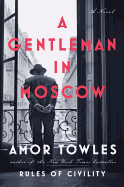
| Publisher: | Viking | |
| Genre: | General, Political, Fiction, Historical, Literary | |
| ISBN: | 9780670026197 | |
| Pub Date: | September 2016 | |
| Price: | $27 |
| Starred | Fiction |
by Amor Towles
Amor Towles's first novel, Rules of Civility, won readers' hearts with its strong sense of time and place, fully realized characters and richly evocative voice. A Gentleman in Moscow repeats the feat with those qualities and more.
In 1922, Count Alexander Ilyich Rostov ("recipient of the Order of Saint Andrew, member of the Jockey Club, Master of the Hunt") appears before a Bolshevik tribunal, accused of "succumbing irrevocably to the corruptions of his class." He responds with quips, and is sentenced to house arrest in the luxury hotel where he has lived for the last four years. "Make no mistake: should you ever set foot outside of the Metropol again, you will be shot."
This stylish and cultured protagonist has already lost his family and its estate. Now two armed guards move him from his suite into a monastic room of one hundred square feet. To brighten Rostov's days, a fellow resident, "the young girl with the penchant for yellow," befriends him. And then the hotel opens for him into a world as broad and rewarding as the one he wishes for his new friend--but ultimately as limiting as well.
A Gentleman in Moscow is filled with literary and cultural references, and with tastes, smells, humor, love and loyalty. Towles indulges in sentimentality to just the right degree. Readers who enjoy a generous, absorbing story, vibrant characters and immersive time and place will fall in love with this saucy novel. And by the time A Gentleman in Moscow closes in 1954, those readers will be sorry to lose the new friend they've found in Rostov. --Julia Jenkins, librarian and blogger at pagesofjulia
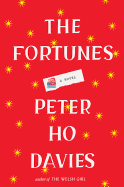
| Publisher: | Houghton Mifflin Harcourt | |
| Genre: | Fiction, Asian American, Literary | |
| ISBN: | 9780544263703 | |
| Pub Date: | September 2016 | |
| Price: | $27 |
| Fiction |
by Peter Ho Davies
Peter Ho Davies's The Fortunes begins with Ling (manservant to one of the owners of the transcontinental railroad), born in China but sold into indentured servitude in the United States. He inadvertently instigates the railroad's hiring of Chinese workers in the mid-19th century, and is present when they strike for the same pay as their white counterparts.
Davies then turns to Anna May Wong, the earliest Chinese American movie star. Her story shows the crippling sexism, ignorance and, of course, racism that pervaded Hollywood. Unlike Ling, who becomes a symbol for his countrymen inadvertently, Anna May fights for the spotlight. The Fortunes takes its discussion of symbol one step further with the 1982 murder of Vincent Chin by two autoworkers who blamed the Japanese for the auto industry's problems, and the organizing among Asian Americans that came in its wake.
These various threads of history come together in the final part, where John Smith, a mixed-race academic who bears more than a few similarities to Davies, travels with his wife to China to adopt a baby. In a sense, everything becomes reversed: a man born of Chinese migration comes back to the source of that migration in order to continue it. The irony is not lost on Smith, who is aware of Ling, Anna May and Vincent. Indeed, he plans to write a book about them.
The brilliance of The Fortunes is not that it expertly dissects Chinese American-ness--or American-ness, for that matter. Davies has conjured a book that forces its readers to find the pressures they face in their own lives, to see how the struggle of self-identity and one's place in the world is alive in each and every one of us. --Noah Cruickshank, marketing manager, Open Books, Chicago, Ill.
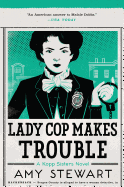
| Publisher: | Houghton Mifflin Harcourt | |
| Genre: | Fiction, Mystery & Detective, Women Sleuths | |
| ISBN: | 9780544409941 | |
| Pub Date: | September 2016 | |
| Price: | $26 |
| Mystery & Thriller |
by Amy Stewart
Being a woman in law enforcement has always carried a particular set of challenges. In her 2015 novel, Girl Waits with Gun, Amy Stewart illuminated those challenges based on the real-life career of Constance Kopp, a tall, outspoken, multilingual woman who (almost by accident) became one of the first female deputy sheriffs in the U.S. In Lady Cop Makes Trouble, Constance returns in another early 20th-century adventure, chasing fugitives, serving as jail matron for Bergen County, N.J., and trying to watch over her two younger sisters, one of whom is harboring dreams of a career on the stage.
Stewart hits another bull's-eye with Constance's first-person narration, giving readers a sharp-eyed, pragmatic, dryly witty protagonist to root for. When Baron von Matthesius, a slippery inmate accused of "serious charges" (on which the sheriff refuses to elaborate), escapes from the local hospital during a thunderstorm, Constance is disgraced and out of a job. Sheriff Heath, too, is called on the carpet for letting the Baron escape. Determined to track down the fugitive (and discover the true nature of those serious charges), Constance heads to New York City, chasing clues all over Manhattan.
While Constance is clearly the star of Stewart's narrative, the minor characters (including a lady reporter and an enigmatic Italian woman jailed for shooting a man) are also well drawn. Sheriff Heath, an honorable man juggling his demanding job and sullen, dissatisfied wife, is also a compelling character. The fast-paced action, wry dialogue and Constance's reflections on her chosen career combine to make Lady Cop Makes Trouble a highly satisfying adventure. --Katie Noah Gibson, blogger at Cakes, Tea and Dreams
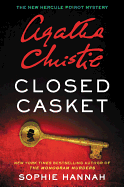
| Publisher: | Morrow | |
| Genre: | Fiction, Mystery & Detective, Traditional | |
| ISBN: | 9780062458827 | |
| Pub Date: | September 2016 | |
| Price: | $26.99 |
| Mystery & Thriller |
by Sophie Hannah, Agatha Christie
When Edward Catchpool of Scotland Yard receives an invitation to Lady Athelinda Playford's home, he assumes it's because the famous mystery author would like to consult with him for her next book. When he arrives, he runs into Poirot, the renowned Belgian detective. Perhaps Lady Playford needs two consultants, Catchpool thinks.
Turns out, she needs both men there for a different reason: to prevent a murder she believes one of her guests--family members and trusted associates--will attempt to commit after she announces she has changed her will to leave her entire, considerable estate to her secretary. A murder does occur, but not at all in the way Lady Playford anticipated, leaving Poirot and Catchpool to solve the confounding puzzle and expose the killer in their midst.
Closed Casket is an entertaining marriage of Christie's style and plot structure, and Hannah's wit and characterizations. She describes one man as having "a bottom lip that curled downwards... as if he had just said, 'Look at this ulcer I have on my gum,' and was attempting to display it." Catchpool is an engaging narrator, the overly discreet butler is a hoot, Lady Playford's unpleasant children are nevertheless well drawn and, of course, Poirot has his moment to shine when he gathers everyone 'round and reveals what happened to the victim in the parlour with the wooden club. --Elyse Dinh-McCrillis, blogger at Pop Culture Nerd
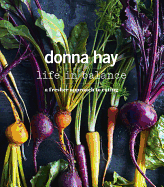
| Publisher: | HarperCollins | |
| Genre: | General, Cooking | |
| ISBN: | 9781460750322 | |
| Pub Date: | September 2016 | |
| Price: | $34.99 |
| Food & Wine |
by Donna Hay
Donna Hay (editor-in-chief of Donna Hay magazine and author of numerous cookbooks) is "not a diet kind of girl." But, as she writes in the introduction to Life in Balance: A Fresher Approach to Eating, she loves the way food can make her feel: "Uplifted, refreshed, cosy or indulgent--the secret, of course, is to find balance." And that's what she does here, with deceptively simple recipes that highlight ingredients that not only satisfy cravings but also nourish bodies.
The cookbook is organized somewhat oddly: some chapters are grouped by meal (breakfasts and snacks), some as collections of recipes based on key ingredients (Super Greens, Power Proteins, Good Grains) and some based on dish type (Clean + Lean, Better Baking + Treats). But with limited narrative text through the recipes and rich, stunning photography on every page, Life in Balance is as much a work of art as it is instructional manual--and so the scattered structure proves less of a detractor than it otherwise might (a thorough index helps, as well).
Then there are the recipes themselves, written with clear, concise instructions and highlighting "super food" ingredients in ways that promise both flavor and satisfaction: Baked Spinach and Parmesan Egg White Souffles; Harissa Lentils with Pickled Onions; Chicken, Zucchini and Feta Meatballs; and Orange and Chia Seed Syrup Cake. Hay's ability to transform good-for-your-body ingredients into good-for-your-tastebuds dishes will appeal to anyone interested in fresh, clean food that doesn't skimp on flavor. --Kerry McHugh, blogger at Entomology of a Bookworm
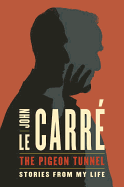
| Publisher: | Viking | |
| Genre: | Political Science, Political, Biography & Autobiography, Literary, Personal Memoirs, Intelligence & Espionage | |
| ISBN: | 9780735220775 | |
| Pub Date: | September 2016 | |
| Price: | $28 |
| Biography & Memoir |
by John le Carré
John le Carré (A Delicate Truth) does not assume you have read his novels, so both old fans and new readers will enjoy his stories of the British Secret Service, the "distraught and sometimes hilarious love-hate affair" between British novelists and spies, his friendships and encounters with various diplomats, political leaders, aristocrats, famous writers (Graham Greene), actors (Richard Burton, Alec Guinness) and film directors (Francis Ford Coppola, Stanley Kubrick, Fritz Lang). Research for his writing has taken him into war zones, prisons, a Laotian opium den and other tricky corners of the world. He tells of his contrasting visits to Russia in 1987 and 1993, his interest in the Muslim Ingush people, two KGB heads he has known, his 1982 meetings with Yasser Arafat, and an uncomfortable interview with a radical young German who collaborated with Palestinian terrorists. There is only a smattering of his personal life, but a full chapter on "Ronnie, conman, fantasist, occasional jailbird, and my father."
Le Carré has the perfect voice of gracious understatement in which to present his astonishing anecdotes. As he says of himself: "when I came to study the dramas of Goethe, Lenz, Schiller, Kleist and Büchner, I discovered that I related equally to their classic austerity, and to their neurotic excesses. The trick, it seemed to me, was to disguise the one with the other." He makes his reader feel like a fortunate dinner guest--this is a memoir to be enjoyed with an alert mind, in a comfortable chair with a good drink. --Sara Catterall
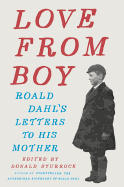
| Publisher: | Blue Rider Press | |
| Genre: | Letters, Literary Collections, Biography & Autobiography, Literary, Editors, Journalists, Publishers | |
| ISBN: | 9780399168468 | |
| Pub Date: | September 2016 | |
| Price: | $26 |
| Biography & Memoir |
by Donald Sturrock, editor
Roald Dahl, renowned for both children's classics and eerie adult short stories, wrote his first letter home from boarding school in 1925, when he was nine years old; Donald Sturrock (Storyteller: The Authorized Biography of Roald Dahl) edits this collection of previously unpublished letters from Dahl to his mother. In Love from Boy, Sturrock's minimal narrative appears alongside the epistolary bulk of the text, accompanied by a small selection of Dahl's photographs and drawings.
Organized in seven chapters by phases of Dahl's life, the correspondence tracks the growth of a beloved imagination and literary career. Over 40 years, Dahl evolves from funny prankster to crafty storyteller to a more serious and cynical mind, particularly following World War II. Dahl had a thoroughly interesting life even before he began writing in earnest: from English boarding schools to travel and corporate work in colonial Africa, hours logged as a Royal Air Force pilot, diplomatic work in the United States and collaboration with Walt Disney in Hollywood. But Love from Boy also provides a personal perspective on his eye for detail and the absurd, his predilection for pranks, his knack for characterization--"He's a short man with a face like a field elderberry, and a moustache which closely resembles the African jungle. A voice like a frog..."--and his quirky preoccupation with personal hygiene, especially dental care. Love from Boy is both an endearing glimpse of a much-loved author and a sober view of mid-20th-century world events. --Julia Jenkins, librarian and blogger at pagesofjulia
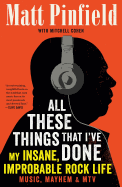
| Publisher: | Scribner | |
| Genre: | General, Rock, Biography & Autobiography, Entertainment & Performing Arts, Music, History & Criticism, Personal Memoirs, Genres & Styles | |
| ISBN: | 9781476793894 | |
| Pub Date: | September 2016 | |
| Price: | $25 |
| Biography & Memoir |
by Matt Pinfield, Mitchell Cohen
Matt Pinfield has lived the rock-and-roll dream. He's been a club DJ, a radio broadcaster, an MTV personality and a talent scout for record companies. He's met a fair number of his heroes along the way, including David Bowie and Kurt Cobain, but he hasn't lost his sense of wonder.
Pinfield tells his music story in All These Things That I've Done: My Insane, Improbable Rock Life. Tales of his rise through the ranks of the business ring true; there's humility under the bluster of Pinfield's conversational delivery. His obvious joy for getting to work with the very people who have inspired him since his early days in New Jersey, as a boy listening to records at his parents' home, fills each page with warm humor and insider's knowledge of the rock-and-roll business, from the 1980s through the present.
His memoir includes vignettes of meeting special performers: Bowie, the Ramones, Oasis, U2, Kiss and Coheed and Cambria. Each of these lay bare the sex, drugs and rock-and-roll lifestyle without glamorizing or demonizing anyone. This is just Pinfield's life, and he's enjoying every minute of it.
Pinfield is a skillful storyteller; while the timeline can get confusing at points due to a more rambling style than is common in traditional autobiography, All These Things That I've Done is a true fan's recollection of the lucky, charmed life he's led. --Rob LeFebvre, freelance writer and editor
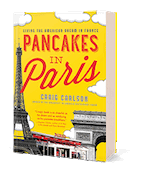
| Publisher: | Sourcebooks | |
| Genre: | Travel, France, Biography & Autobiography, Europe, Personal Memoirs, Culinary | |
| ISBN: | 9781492632122 | |
| Pub Date: | September 2016 | |
| Price: | $15.99 |
| Biography & Memoir |
by Craig Carlson
Why would a former Hollywood screenwriter, with no business or restaurant experience, open an American diner in Paris? Pancakes in Paris answers that question by recounting Craig Carlson's wildly circuitous journey to living his dream in the "City of Lights." A determined, tenacious risk-taker, Carlson unscrambles the unconventional aspects of his life, tracing the chronological route he traveled to launch Breakfast in America, a popular restaurant chain located in the heart of Paris.
Carlson, now in his 50s, was raised in upstate Connecticut, the son of divorced parents and the youngest of four children in a poor Polish-Finnish immigrant family. His mother was bipolar and often institutionalized. His father, an alcoholic with a gambling problem, was a "swinging bachelor" known as "Fast Eddie" with the ladies. This left Craig and his siblings to be raised largely by his grandparents. "Despite all the evidence to the contrary... I always felt loved--just never wanted."
France was far from Carlson's radar. His first exposure occurred when he was seven years old. Carlson and his older sisters had been cruising around in Fast Eddie's "chick mobile," a rusted old station wagon, when his sisters started talking in French to shroud the details of their less-than-stellar opinion of their father. As Carlson listened to his sisters' exchange, he understood perfectly: "...I had a gift for languages right from the start."
This incident was just one of many eerie French-related coincidences. Carlson's mother eventually eloped to Florida with her boyfriend, a charmless French Canadian. And when Carlson, at age 12, went to live with his father in Frenchtown--a tough neighborhood infused with poverty and crime, where not a single French person lived--he quickly developed strong survival and entrepreneurial skills, which set the foundation for his future business endeavours. When Carlson had to select a foreign language to study in school, he chose French: "From that moment on, mon destin was set in motion."
Studying French inspired a sense of wanderlust in Carlson, who longed to escape small-town life. In his junior year at the University of Connecticut, he was selected to study abroad. A year in Paris, Normandy and Rouen seemed a dream come true, but tested Carlson's preconceived ideas about French living. He was assigned to live with a spinster--a "half mad genius, half schoolmarm" and terrible cook--who put Carlson and his roommate up in a backyard shed. A trip to the annual Gastronomic Fair in Dijon proved a turning point that encouraged Carlson to stay in France at the conclusion of the program. He rented an apartment in the Latin Quarter, worked at an English-language school and fell in love with French cinema.
When he returned to the States, he was accepted into the film program at the University of Southern California. He paid his tuition by becoming a contestant on Wheel of Fortune. His winning experience served as the subject for his short thesis, an award-winning film slated for an Oscar screening; it never happened because of the 1992 Rodney King riots. Carlson's chance for success fizzled until fate intervened again via a job lead for a French television show. When the show ended, Carlson, now in his 30s, came back to the States in search of a "good ol' American breakfast." When he stared down at a ham steak, scrambled eggs, home-fried potatoes and buckwheat pancakes, inspiration struck: "Paris has it all. The Louvre. The Eiffel Tower. Romance and fine cuisine. But one thing it doesn't have is an authentic American breakfast."
Carlson set out to change that, educating himself on the business of opening an American diner in Paris. The odds were stacked against him, but he developed a management plan for his diner, Breakfast in America (BIA), inspired by the title of a 1980s hit song. Acquiring rights to the name proved almost as difficult as landing investors for a project whose baseline costs escalated from $5,000 to $250,000. Yet again, he was forced to look for work. A job in the marketing department of the Walt Disney Company, and the unexpected good fortune of a later corporate buy-out package, granted Carlson the collateral needed to reel in BIA backers.
Bidding goodbye to L.A. and a girlfriend, Carlson moved back to France, where he scouted diner locations, met colorful personalities and, after facing repeated heartbreaks and disappointments, finally leased an old French café. Renovations, unreliable contractors and hiring competent staff--including chefs who had to learn how to cook American food--were as taxing as acquiring American ingredients such as peanut butter, cheddar cheese and maple syrup. By 2003, BIA opened its doors, serving breakfast all day, along with hamburgers and milkshakes. Just as business was taking off, America invaded Iraq and anti-Americanism soared in France. BIA, however, soon became featured in the press as a "cultural crossroads between conflicted countries," and also a place where anyone--French or American--could enjoy a good hamburger and even a traditional Thanksgiving Dinner.
For years, Carlson worked seven days a week. He assembled a strong restaurant team--a varied group of employees from different cultural backgrounds--though a few exceptions caused Carlson serious problems, including the inability to comply with the stringent, "screwy French system" of labor. Legal disputes with several disgruntled employees who took advantage of Carlson's good nature ultimately led to Carlson's arrest and forced BIA to shut down temporarily.
Despite repeated challenges, Carlson remained determined for BIA to succeed, despite differences between French and American cuisine, tipping policies and the concept of "doggie bags." BIA became a cultural hub, hosting literary nights and live music events, ultimately morphing into the supportive family that Carlson had always longed for. This realization led Carlson, in 2005, to finally address his long-time intimacy issues. He then met Julien--a loving, caring man and Carlson's soul mate. The love they share led to the launch of a second, and later a third, BIA location.
The detailed, linear facts of Carlson's frenetic, inspiring account speak volumes. But the tragicomic tone of Carlson's writing, along with cliff-hanger chapter endings, are what perfectly season the overall arc of this entertaining success story. At one point, when things seem most bleak, a friend of Carlson's says, "I know things are confusing right now. But I truly believe that one day your life is going to make sense. That all the twists and turns, all the ups and downs.... They happened for a reason." This wisdom propels Carlson to press on through hard times. And by the 10-year anniversary of BIA, Carlson looks back on his life-changing experiences and his accomplishments in living an American dream in the land of crepes and croissants with pride, nostalgia and an overt sense of gratitude.--Kathleen Gerard, blogger at Reading Between the Lines
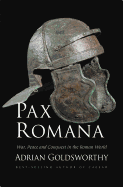
| Publisher: | Yale University Press | |
| Genre: | Ancient, History, Rome | |
| ISBN: | 9780300178821 | |
| Pub Date: | September 2016 | |
| Price: | $32.50 |
| Starred | History |
by Adrian Goldsworthy
The Pax Romana, or Roman Peace, was an approximately 200-year period of relative stability within the Roman Empire, from the reign of its first emperor, Augustus, until a series of political and economic crises in the third century AD. The term conjures images of peaceful trade and minimal military trouble, a generally beneficial experience for Rome's subjects. But how accurate are these images?
Pax Romana by Adrian Goldsworthy, author of multiple books on Rome, including monumental biographies of Julius Caesar and Augustus, reveals the truth behind Rome's golden age. Goldsworthy approaches the subject without an agenda--he neither wants to disprove the popular conception of a prosperous period nor refute some recent scholarship that dismisses this era as imperial banditry. Both views, he argues, are oversimplifications. Instead, Pax Romana seeks a truth that lies somewhere in between.
Goldsworthy begins in the era of the Republic, to see what life was like for Romans and the increasing number of provincials as the city's power expanded. He then moves on to Augustus and his immediate successors, the Pax proper. In both periods, he considers all strata of Roman society and those affected (or afflicted) by the Romans. This results in a nuanced portrait in which the Pax Romana was, compared to the rest of the ancient world--and Rome's own history--a preferable time to be alive. But there were clear winners and losers, both within the empire and without. Pax Romana is a fascinating work that manages to avoid becoming dry despite its detail. Readers interested in Roman history will find it remarkable. --Tobias Mutter, freelance reviewer
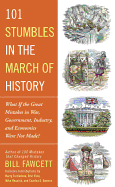
| Publisher: | NAL | |
| Genre: | North American, General, History, World, Military | |
| ISBN: | 9781101987049 | |
| Pub Date: | September 2016 | |
| Price: | $17 |
| History |
by Bill Fawcett
History is a realm of what-ifs. What if Montezuma had acted immediately and decisively against the conquistador Hernán Cortés? What if Pope Clement VII had annulled Henry VIII's marriage to Catherine of Aragon? What if Russia hadn't sold Alaska to the United States for a pittance? What if President Jimmy Carter had sent along one extra helicopter on the mission to rescue the Americans held hostage in Iran? And, of course, what if dozens of critical decisions in wars and battles throughout history had been made differently?
In 101 Stumbles in the March of History: What if the Great Mistakes in War, Government, Industry, and Economics Were Not Made? by Bill Fawcett, with contributions from Harry Turtledove, Eric Flint, Mike Resnick and Charles Gannon, these and other historical missteps are cataloged in brief, irreverent entries. Each mistake receives some shallow historical context and an extrapolation of various alternate history possibilities. Sometimes these extrapolations are dubious, or tainted by a contributor's personal political preferences, but are usually at least thought provoking. In the case of Henry VIII's annulment, for example, the continued official dominance of Catholicism in England would have deprived the emerging Reformation of one of its chief allies, and that extra helicopter might have won Jimmy Carter a second term.
Many of these fumbles are, as might be expected, in the province of military history. Still, there's enough variety to give 101 Stumbles broader appeal. It's a book built for breezy reading, a few pop-history entries at a time, something fun rather than scholarly. --Tobias Mutter, freelance reviewer

| Publisher: | Caitlyn Dlouhy/Atheneum | |
| Genre: | People & Places, General, Sports & Recreation, Juvenile Fiction, United States - African-American, Track & Field, Social Themes | |
| ISBN: | 9781481450157 | |
| Pub Date: | August 2016 | |
| Price: | $16.99 |
| Starred | Children's & Young Adult |
by Jason Reynolds
Sometimes a whole life can change in one night. For seventh-grader Castle Cranshaw, that night was three years ago when his father tried to shoot him and his mother, when "the liquor made him meaner than he'd ever been." That's when Castle started to call himself "Ghost," because Mr. Charles, who let the terrified pair take refuge in his all-night store, "looked at us like he was looking at two ghosts." And that was the night he learned how to run... really run.
Jason Reynolds (As Brave as You) has a playful, intimate and conversational style, and in Ghost, a middle-grade series debut, he tells the story of how an unforgettable flight of terror led to an African American boy's instinct to run--fast. One day on his walk home, Ghost sees a track team practicing with their short bald coach who looks like "a turtle with a chipped tooth." Keenly observant Ghost becomes annoyed with one of the runners others perceive as unbeatable, and decides to "keep up with him, if not beat him" even though he "ain't ever had a running lesson." He stubbornly persists until the coach relents: "Listen, you get one run, you hear me?"
The story of Ghost's evolving relationships with his anger, with his ever-worried mother, with Coach Brody and with running is a joy to read. For a boy who's "got a lot of scream inside," Ghost can riff entertainingly on topics from eating sunflower seeds to 100-meter sprints. Ghost is about kids who are, in both senses, running for their lives, and the generous souls who help them along the way. --Karin Snelson, children's & YA editor, Shelf Awareness
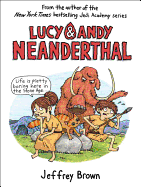
| Publisher: | Crown | |
| Genre: | General, Prehistory, Juvenile Fiction, Humorous Stories, Historical, Comics & Graphic Novels | |
| ISBN: | 9780385388351 | |
| Pub Date: | August 2016 | |
| Price: | $12.99 |
| Children's & Young Adult |
by Jeffrey Brown
Siblings squabble. It's a fact of life today, and, apparently, it was true of Neanderthal kids 40,000 years ago, too--at least according to this entertaining (and sneakily educational) graphic novel with fun black-and-white illustrations. Lucy and Andy, a Stone Age sister and her little brother, bicker over chores, blame each other for farts and resort to the time-honored "Told you so" when one wins an argument. They also support and protect each other, as when Lucy tells bossy teen cave-mate Phil to leave Andy alone: "[H]e's my brother, so only I get to give him a hard time." Andy is dying to go on a mammoth hunt with the older members of the group, but is thwarted at every turn. Clever Lucy's smart ideas and dry comments go right over everyone's heads.
Lucy & Andy Neanderthal is the first in a series by Jeffrey Brown, the creator of the Jedi Academy and Darth Vader picture-book series. Young readers will giggle at chapters like "Gluten-Free Organic Mammoth Dinner" (Andy is too grossed out after secretly watching the hunt to enjoy his mammoth steak) and "NeandARThals" (Lucy discovers her artistic ability during a boring rainy day inside the cave). Two adult paleontologists (one African American, one white) periodically interrupt the action with cartoon-bubble dialogue to provide detailed background information about this era and its people. A timeline, myth busters and a list of cavemen in the media (think Fred Flintstone, Croods...) are included. Fact and fiction cleverly collide in this prehistoric romp. --Emilie Coulter, freelance writer and editor